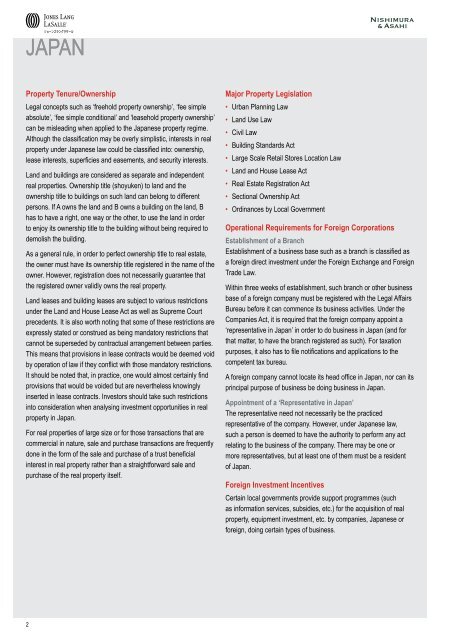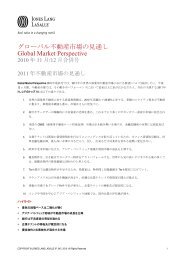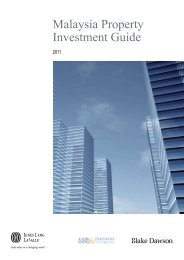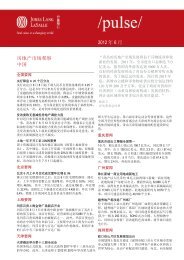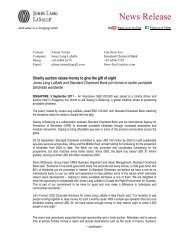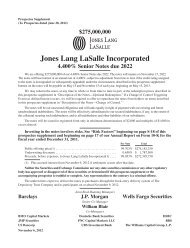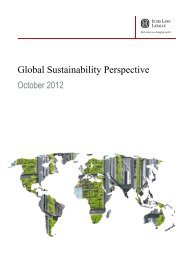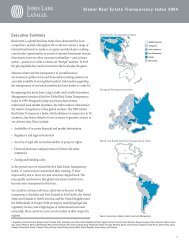Japan Property Investment Guide - Jones Lang LaSalle
Japan Property Investment Guide - Jones Lang LaSalle
Japan Property Investment Guide - Jones Lang LaSalle
You also want an ePaper? Increase the reach of your titles
YUMPU automatically turns print PDFs into web optimized ePapers that Google loves.
JAPAN<br />
<strong>Property</strong> Tenure/Ownership<br />
Legal concepts such as ‘freehold property ownership’, ‘fee simple<br />
absolute’, ‘fee simple conditional’ and ‘leasehold property ownership’<br />
can be misleading when applied to the <strong>Japan</strong>ese property regime.<br />
Although the classification may be overly simplistic, interests in real<br />
property under <strong>Japan</strong>ese law could be classified into: ownership,<br />
lease interests, superficies and easements, and security interests.<br />
Land and buildings are considered as separate and independent<br />
real properties. Ownership title (shoyuken) to land and the<br />
ownership title to buildings on such land can belong to different<br />
persons. If A owns the land and B owns a building on the land, B<br />
has to have a right, one way or the other, to use the land in order<br />
to enjoy its ownership title to the building without being required to<br />
demolish the building.<br />
As a general rule, in order to perfect ownership title to real estate,<br />
the owner must have its ownership title registered in the name of the<br />
owner. However, registration does not necessarily guarantee that<br />
the registered owner validly owns the real property.<br />
Land leases and building leases are subject to various restrictions<br />
under the Land and House Lease Act as well as Supreme Court<br />
precedents. It is also worth noting that some of these restrictions are<br />
expressly stated or construed as being mandatory restrictions that<br />
cannot be superseded by contractual arrangement between parties.<br />
This means that provisions in lease contracts would be deemed void<br />
by operation of law if they conflict with those mandatory restrictions.<br />
It should be noted that, in practice, one would almost certainly find<br />
provisions that would be voided but are nevertheless knowingly<br />
inserted in lease contracts. Investors should take such restrictions<br />
into consideration when analysing investment opportunities in real<br />
property in <strong>Japan</strong>.<br />
For real properties of large size or for those transactions that are<br />
commercial in nature, sale and purchase transactions are frequently<br />
done in the form of the sale and purchase of a trust beneficial<br />
interest in real property rather than a straightforward sale and<br />
purchase of the real property itself.<br />
2<br />
Major <strong>Property</strong> Legislation<br />
•<br />
•<br />
•<br />
•<br />
•<br />
•<br />
•<br />
•<br />
Urban Planning Law<br />
Land Use Law<br />
Civil Law<br />
Building Standards Act<br />
Large Scale Retail Stores Location Law<br />
Land and House Lease Act<br />
Real Estate Registration Act<br />
Sectional Ownership Act<br />
•<br />
Ordinances by Local Government<br />
Operational Requirements for Foreign Corporations<br />
Establishment of a Branch<br />
Establishment of a business base such as a branch is classified as<br />
a foreign direct investment under the Foreign Exchange and Foreign<br />
Trade Law.<br />
Within three weeks of establishment, such branch or other business<br />
base of a foreign company must be registered with the Legal Affairs<br />
Bureau before it can commence its business activities. Under the<br />
Companies Act, it is required that the foreign company appoint a<br />
‘representative in <strong>Japan</strong>’ in order to do business in <strong>Japan</strong> (and for<br />
that matter, to have the branch registered as such). For taxation<br />
purposes, it also has to file notifications and applications to the<br />
competent tax bureau.<br />
A foreign company cannot locate its head office in <strong>Japan</strong>, nor can its<br />
principal purpose of business be doing business in <strong>Japan</strong>.<br />
Appointment of a ‘Representative in <strong>Japan</strong>’<br />
The representative need not necessarily be the practiced<br />
representative of the company. However, under <strong>Japan</strong>ese law,<br />
such a person is deemed to have the authority to perform any act<br />
relating to the business of the company. There may be one or<br />
more representatives, but at least one of them must be a resident<br />
of <strong>Japan</strong>.<br />
Foreign <strong>Investment</strong> Incentives<br />
Certain local governments provide support programmes (such<br />
as information services, subsidies, etc.) for the acquisition of real<br />
property, equipment investment, etc. by companies, <strong>Japan</strong>ese or<br />
foreign, doing certain types of business.


